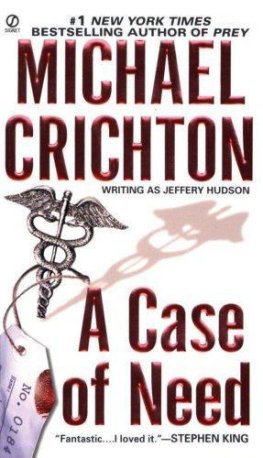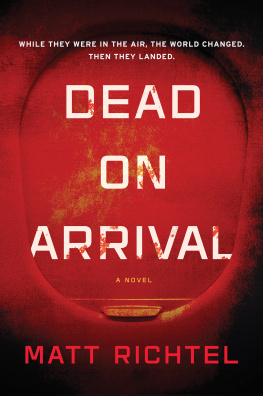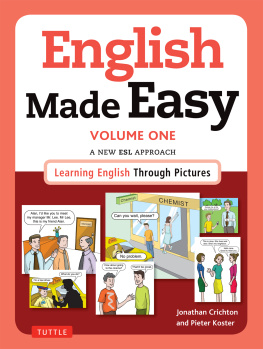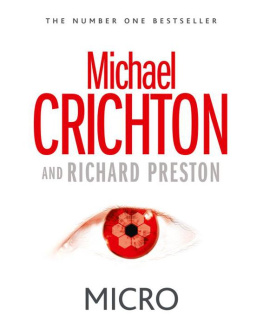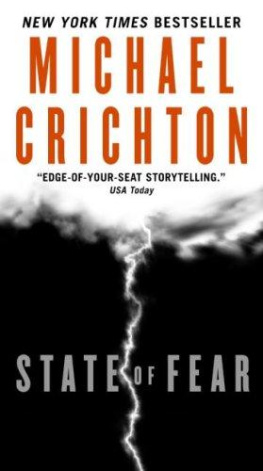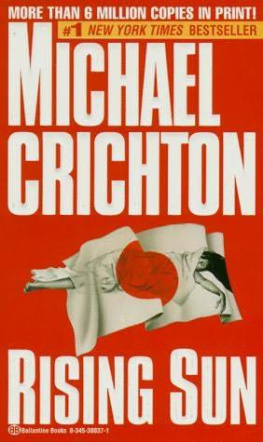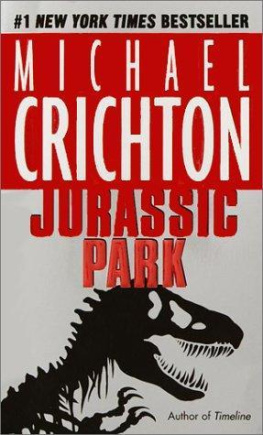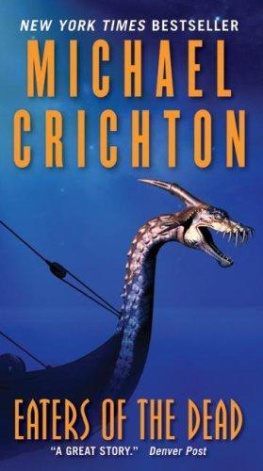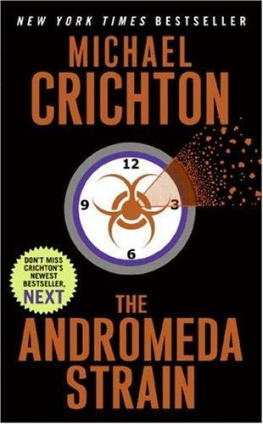Crichton - Eaters of the Dead
Here you can read online Crichton - Eaters of the Dead full text of the book (entire story) in english for free. Download pdf and epub, get meaning, cover and reviews about this ebook. genre: Detective and thriller. Description of the work, (preface) as well as reviews are available. Best literature library LitArk.com created for fans of good reading and offers a wide selection of genres:
Romance novel
Science fiction
Adventure
Detective
Science
History
Home and family
Prose
Art
Politics
Computer
Non-fiction
Religion
Business
Children
Humor
Choose a favorite category and find really read worthwhile books. Enjoy immersion in the world of imagination, feel the emotions of the characters or learn something new for yourself, make an fascinating discovery.

- Book:Crichton - Eaters of the Dead
- Author:
- Genre:
- Rating:3 / 5
- Favourites:Add to favourites
- Your mark:
- 60
- 1
- 2
- 3
- 4
- 5
Crichton - Eaters of the Dead: summary, description and annotation
We offer to read an annotation, description, summary or preface (depends on what the author of the book "Crichton - Eaters of the Dead" wrote himself). If you haven't found the necessary information about the book — write in the comments, we will try to find it.
Unknown: author's other books
Who wrote Crichton - Eaters of the Dead? Find out the surname, the name of the author of the book and a list of all author's works by series.
Crichton - Eaters of the Dead — read online for free the complete book (whole text) full work
Below is the text of the book, divided by pages. System saving the place of the last page read, allows you to conveniently read the book "Crichton - Eaters of the Dead" online for free, without having to search again every time where you left off. Put a bookmark, and you can go to the page where you finished reading at any time.
Font size:
Interval:
Bookmark:
Eaters of the Dead The Manuscript of Ibn Fadlan, Relating His Experiences with the Northmen in A.D. 922 by Michael Crichton CONTENTS APPENDIX: The Mist Monsters |
Praise not the day until evening has come; a woman until she is burnt; a sword untilit is tried; a maiden until she is married; ice until it has been crossed; beeruntil it has been drunk.
VIKING PROVERB
Evil is of old date.
ARAB PROVERB
THE IBN FADLAN MANUSCRIPTREPRESENTS THE earliest known eyewitness account of Viking life and society. Itis an extraordinary document, describing in vivid detail events which occurredmore than a thousand years ago. The manuscript has not, of course, survivedintact over that enormous span of time. It has a peculiar history of its own,and one no less remarkable than the text itself.
In June, A.D.921, the Caliph of Bagdad sent a member of his court, Ahmad Ibn Fadlan, asambassador to the King of the Bulgars. Ibn Fadlan was gone three years on hisjourney and never actually accomplished his mission, for along the way heencountered a company of Norsemen and had many adventures among them.
When he finallyreturned to Bagdad, Ibn Fadlan recorded his experiences in the form of anofficial report to the court. That original manuscript has long sincedisappeared, and to reconstruct it we must rely on partial fragments preservedin later sources.
The best-known ofthese is an Arabic geographical lexicon written by Yakut ibn-Abdallah sometimein the thirteenth century. Yakut includes a dozen verbatim passages from IbnFadlans account, which was then three hundred years old. One must presumeYakut worked from a copy of the original. Nevertheless these few paragraphshave been endlessly translated and retranslated by later scholars.
Another fragmentwas discovered in Russia in 1817 and was published in German by the St. Petersburg Academy in 1823.This material includes certain passages previously published by J. L. Rasmussenin 1814. Rasmussen worked from a manuscript he found in Copenhagen,since lost, and of dubious origins. There were also Swedish, French, andEnglish translations at this time, but they are all notoriously inaccurate andapparently do not include any new material.
In 1878, two newmanuscripts were discovered in the private antiquities collection of Sir JohnEmerson, the British Ambassador in Constantinople. Sir John was apparently one of those avid collectorswhose zeal for acquisition exceeded his interest in the particular itemacquired. The manuscripts were found after his death; no one knows where heobtained them, or when.
One is ageography in Arabic by Ahmad Tusi, reliably dated at A.D. 1047. This makes theTusi manuscript chronologically closer than any other to the original of IbnFadlan, which was presumably written around A.D. 924-926. Yet scholars regardthe Tusi manuscript as the least trustworthy of all the sources; the text isfull of obvious errors and internal inconsistencies, and although it quotes atlength from one Ibn Faqih who visited the North country, many authorities hesitate toaccept this material.
The secondmanuscript is that of Amin Razi, dating roughly from A.D. 1585-1595. It iswritten in Latin and according to its author is translated directly from theArabic text of Ibn Fadlan. The Razi manuscript contains some material about theOguz Turks, and several passages concerning battles with the mist monsters, notfound in other sources.
In 1934, a finaltext in Medieval Latin was found in the monastery of Xymos, near Thessalonikain northeastern Greece. The Xymos manuscript contains further commentary onIbn Fadlans relations with the Caliph, and his experiences with the creaturesof the North country. The author and date of the Xymos manuscript are bothuncertain.
The task ofcollating these many versions and translations, ranging over more than athousand years, appearing in Arabic, Latin, German, French, Danish, Swedish,and English, is an undertaking of formidable proportions. Only a person of greaterudition and energy would attempt it, and in 1951 such a person did. PerFraus-Dolos, Professor emeritus of Comparative literature at theUniversity of Oslo, Norway, compiled all the known sources and began themassive task of translation which occupied him until his death in 1957.Portions of his new translation were published in the Proceedings of theNationalMuseumofOslo: 1959-1960,but they did not arouse much scholarly interest, perhaps because the journalhas a limited circulation.
The Fraus-Dolostranslation was absolutely literal; in his own introduction to the material,Fraus-Dolos remarked that it is in the nature of languages that a prettytranslation is not accurate, and an accurate translation finds its own beautywithout help.
In preparing thisfull and annotated version of the Fraus-Dolos translation, I have made fewalterations. I deleted some repetitive passages; these are indicated in thetext. I changed paragraph structure, starting each directly quoted speaker witha new paragraph, according to modern convention. I have omitted the diacriticalmarks on Arabic names. Finally, I have occasionally altered the originalsyntax, usually by transposing subordinate clauses so that the meaning is morereadily grasped.
Ibn Fadlansportrait of the Vikings differs markedly from the traditional European view ofthese people. The first European descriptions of the Vikings were recorded bythe clergy; they were the only observers of the time who could write, and theyviewed the pagan Northmen with special horror. Here is a typically hyperbolicpassage, cited by D. M. Wilson, from a twelfth-century Irish writer:
In a word, although there were an hundred hard-steelediron heads on one neck, and an hundred sharp, ready, cool, never rusting,brazen tongues in each head, and an hundred garrulous, loud, unceasing voicesfrom each tongue, they could not recount or narrate, enumerate or tell, whatall the Irish suffered in common, both men and women, laity and clergy, old andyoung, noble and ignoble, of the hardships and of injuring and of oppression,in every house, from those valiant, wrathful, purely pagan people.
Modern scholarsrecognize that such bloodcurdling accounts of Viking raids are vastlyexaggerated. Yet European writers still tend to dismiss the Scandinavians asbloody barbarians, irrelevant to the main flow of Western culture and ideas.Often this has been done at the expense of a certain logic. For example, DavidTalbot Rice writes:
From the eighth to the eleventh centuries indeed therole of the Vikings was perhaps more influential than that of any other singleethnic group inWestern Europe.... The Vikings were thus great travellers and theyperformed outstanding feats of navigation; their cities were great centres of trade;their art was original, creative and influential; they boasted a fineliterature and a developed culture. Was it truly a civilization? It must, Ithink, be admitted that it was not.... The touch of humanism which is thehallmark of civilization was absent.
This same attitude is reflected in the opinion of Lord Clark:
When one considers the Icelandic sagas, which are amongthe great books of the world, one must admit that the Norsemen produced aculture. But was it civilization? ... Civilization means something more thanenergy and will and creative power: something the early Norsemen hadnt got,but which, even in their time, was beginning to reappear in
Font size:
Interval:
Bookmark:
Similar books «Crichton - Eaters of the Dead»
Look at similar books to Crichton - Eaters of the Dead. We have selected literature similar in name and meaning in the hope of providing readers with more options to find new, interesting, not yet read works.
Discussion, reviews of the book Crichton - Eaters of the Dead and just readers' own opinions. Leave your comments, write what you think about the work, its meaning or the main characters. Specify what exactly you liked and what you didn't like, and why you think so.

